The Will to Scorn
By:
December 26, 2011
This article was first published in Hermenaut #15 (Summer 1999). Hermenaut was published and edited from 1991-2000 by HiLobrow cofounder Joshua Glenn. Click here to read more from Hermenaut and Hermenaut.com.
If you’ve ever been to a movie theater then you may also have been outside the theater or in its lobby. In these places on bad days you might encounter people in flagrant violation of the Golden Rule of cinematic etiquette: Keep your fool mouth shut about this movie, other movies, and anything that’s ever been associated with a movie. The reason is that when you fling wide your pie hole and pass opinion in public you’re exposing people who have never done you any harm to attitudes against which they are particularly defenseless on account of having either just formed some of their own or readied themselves to form some, and in consequence of this one or more of them may have to strike you dead on the spot. Restraint here is a matter of etiquette rather than self-preservation because it’s entirely your affair whether you choose to live or die, but it’s inconsiderate in the extreme to expose perfect strangers to the risk of life imprisonment simply because you can’t wait till you get to the car before you release your foul interpretations. I most certainly do not exempt myself from this restriction; on the contrary, as will be seen it’s among my fondest wishes that there be someone at every feature I attend who would be incapable of not murdering me for thoughtless venting; as I hope for them to remain happily at large, my word is “mum.”
These people are fine; they are your friends. They only mean you harm, and if they do happen to kill you it will be entirely personal. The ones you want to fear and shun are the ones who on overhearing one of these unfortunate broadcasts — which could be your own if you’re not looking sharp — turn to their dates, roll their various eyes and chuckle benignantly: the Scorners.
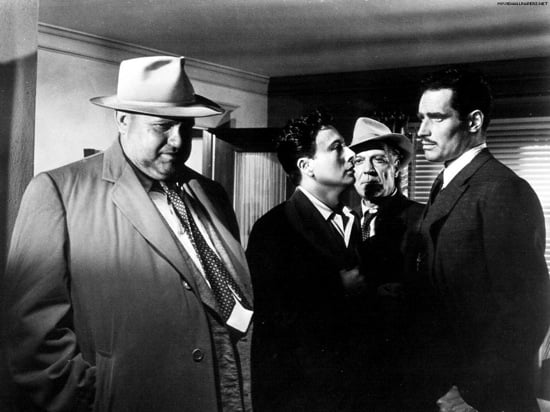
What is it like, this scorn? Well, if you’ve ever been to a movie theater where they were showing a movie more than about fifteen years old, unless you were very lucky it was all around you. I recently saw the revised rerelease of Touch of Evil, an Orson Welles joint, and enjoyed it very much; I think it’s a swell picture. Current audiences don’t necessarily dig it though so at the end when Marlene Dietrich pronounced the story’s judgment on Orson Welles’ unsanitary old detective most of the house broke into titters mainly provoked, I think, by Dietrich’s now-unfashionable solemnity. It wasn’t the first unintended comedy they’d found in the work, but because they’d come to see a Classic and had been entertained they left the theater feeling benign, edumacated, and content. This is genial scorn, the kind that starts to smile when the movie begins because, tee hee, it’s only black and white: Sure, they did their best trying to make movies in olden times, but the technology was too primitive to do anything that looked real, so you know when monkeys make faces that look like they’re thinking? It’s like that. Tee hee; tee hee hee.
I have a report, however, of a showing of this same picture maybe fifteen years ago, when it was less a Classic than an Old Movie. In those days the audience apparently didn’t so much chuckle at its quaintness as roar at its out-of-date inanity and impossibility. When the lights came up the female of the prosperity-in-sight young couple seated in front of my informant laughed to her man, “Well that was the worst movie I’ve ever seen.” Actually it was very likely the best; she may also have gone to see the rerelease and been “very impressed” by it, never remembering having seen it back when it was old-fashioned and terrible instead of a charming attempt and a fine example of what could be done even back then with such limited means. A sufficiently official Seal of Approval will always sway the opinion of a Scorner; once you’ve stamped their brains they’ll greet your product not with Scorn, but Delight.
Now the reaction of this young lady — let’s call her Leslie — to a movie she thought was terrible was amused scorn and disdain. If you cock your head and squint a little you can see fodder for that attitude in Touch of Evil: Charlton Heston doesn’t “seem” like a “Mexican detective”; Welles is certainly very fat; Dietrich’s languid cynicism must be a put-on because who ever feels like that? The world’s Leslies and all their dates could not be more perfectly wrong about considering any of this grounds for even the simplest criticism, but these are the sorts of things to which they enjoy reacting.
So what, by contrast, do the theater-lobby massacrists feel? I happen to know: On hearing a good movie scorned they feel much the same as I felt after I saw Chasing Amy. It made me angry. Sure, sure, I know Chasing Amy gives the impression of being less an offense than a simple critically-acclaimed-pathetic-spectacle, but if you think about it its relentless, recursive falsity can make you see the brightest red.

Take it from the top — in the very first exchange we have an overweight comix fan enthusing to Ben “Beady Eyes” Affleck about the heroes of the book he puts out: “They’re like Bill and Ted meet… Cheech and Chong!” Well, that’s pretty lame-brained, but the guy’s supposed to be a lame-brain, so let’s allow it. Holden’s smirking response, however, is “yeah… I kinda like to think of them as Rosenkrantz and Guildenstern meet Vladimir and Estragon.” Not just lame-brained with a whole Bachelor’s in English Lit, but really nasty to boot; you can tell the line is actually supposed to end, “…Vladimir and Estragon, asshole.” Right up front “writer-director” Kevin Smith is telling you this is his idea of a proper relationship between artist and audience; and since Smith makes Affleck — “Holden”, for crying out loud — his transparent stand-in, he’s saying that this is what he thinks of you.
Is that a problem? Must the artist feel love and respect for every specimen that might drop by the theater because it’s hot outside? Of course not. But any proper work of art must be an act of communication — or at least an attempt at it. Your medium, milieu, talent may not be up to the demands of the message, but communication is what it must seek to be. Of anything — doesn’t matter what; suit yourself — but the only thing that can make it art is your attempting to convey whatever your ridiculous point is despite the mighty barriers separating all our conflicting understandings. “Expression,” as an artistic credential, is for the idiots who paint the terrible pictures for sale in cafés; communication is what you do with the things you need to share, and for that you need to believe in an audience you respect. If necessary you may distinguish your audience from the mass of folks who just happen to get exposed to your work and towards those latter you may be as disagreeable as you please — if you really feel you must — but your proper audience has to receive your respect. They may be purely hypothetical or not born yet or all dead or all humans everywhere — you may even hate them — but you have to be addressing somebody whom you expect to Get It or you’re just jerking off. To create art that doesn’t intend communication is to commit art for art’s sake, which is no kind of art at all; it might be very lovely, and so is an orchid. If you happen to like orchids. Even if what you’re telling your audience is “Attention, Shoppers: you suck!” you’re respecting them by a) crediting them with the wit to apprehend your meaning as well as the life to have a reaction, and b) implicitly finding them sufficiently significant that you’re motivated to tell them so instead of not bothering. You just had to share that.
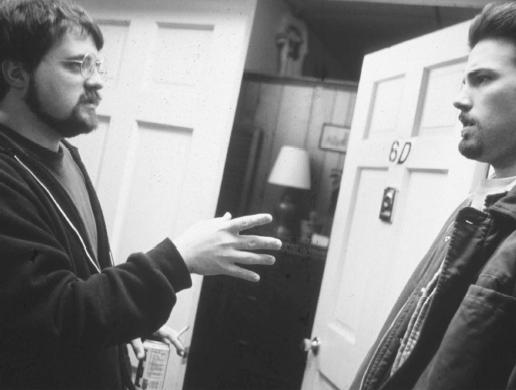
Smith on the other hand is content to amuse himself saying things he knows the audience isn’t going to understand, like “Rosenkrantz and Guildenstern meet Vladimir and Estragon” — the kids at the Octoplex may have read the Shakespeare (though without remembering that part), but not the Beckett and certainly not the Stoppard. Is the line structurally required or helpful? No, it’s a throwaway — doesn’t advance anything. It’s nothing but Smith explicitly saying “You ignoranimus! Here, I’ll spit in your face and you’ll like it just because I’m talking to you! There!” What he’s doing is Expressing Himself, for the benefit of that guy across the aisle who chuckled extra loud at that line so everyone would know he got it. Smith isn’t communicating because he isn’t saying what he says — what does that mean, “Rosenkrantz and Guildenstern meet Vladimir and Estragon”? What would it be like if you did blend those characters? A great deal of very little, right? But we know from other scenes in the movie that that’s not what those comic-heroes of Holden’s are like — they have sex and kill people and all sorts of regular comix stuff; they are heroes and not antiheroes. So Smith specifically does not mean exactly what he’s saying; whatever he’s saying, he means not that, and is not saying it to say it, but for the effect of having said it, which isn’t communication. He’s saying it so the guy he isn’t addressing, the chuckling one, will know he’s cool.
He loses interest in us popcorn-munching no-accounts pretty quickly though; a few other fans appear and receive similarly low regard but mostly we’re beneath his notice. Black nationalism is also randomly picked up and casually dismissed for laffs: Holden and sidekick attend the lecture of an Angry Black Cartoonist who has a lot to say about cultural colonialism and the like; sidekick baits him with stupid questions to the improbable point that the ABC pulls a large pistol and shoots him, causing the rest of the audience to scream and flee in terror. Kidding! It was all a gag, everybody — we’re friends! We used blanks! Are audiences stupid or what? Har har har.
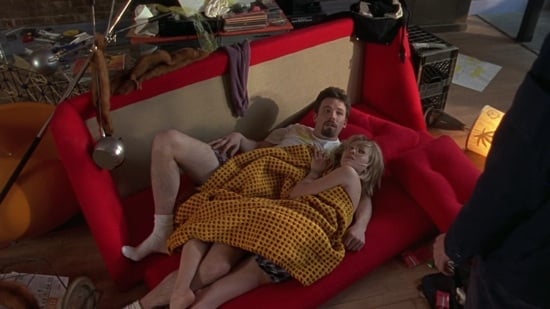
The most significant truth about Black nationalism, see, is that it’s a put-on used by slightly artistic fags for marketing purposes. This, apparently, is the level to which Smith is prepared to respect anything which isn’t himself: the level of utilization. No, Smith’s real deal, his one true thing, is that this guy really digs this girl, see, only she’s like kookoo, a lesbo-whoa! Can you get your head around that? The chick’s cool though, she’s thought it through — you can tell because she talks like a textbook of Alternative Lifestyle Sociology. Okay, yes, I’m scorning here — in the important respects the awkwardness of Alyssa’s lines is no more relevant than the squeakiness of her voice. But those of you who are orientated towards women (if you’re the man-liking type just follow along here; the situation is actually even more horrifying if the sexes are switched, the same way a Democrat can get away with the SDI the Republicans couldn’t have), imagine that you’ve just begun what seems like a really nice new relationship; you’re lying there ill-advisedly smoking in bed having done it till you can’t do it no more, and, like, you want to know — you ask her the “how come me?” question, and in this case with the especially charged rider “since you always liked (the other kind) before.” And this new girlfriend of yours says, “Historically, yes, that’s true. I’ve given that a lot of thought — now that I’m being ostracized by my friends I’ve had a lot of time for that — and what I’ve come up with is really simple. I came to this on my own terms. I didn’t just heed what I was taught: Men and women should be together, it’s the ‘natural way,’ that kinda thing. I’m not with you because of what family, society, life tried to instill in me from day one. The way the world is, how seldom it is you meet the one person who just gets you — it’s so rare.”
Carita! You know what it does to me when you speak social theory! She goes on like that, believe it or not, in this same mode that used to make the fifes play for Oliver on Green Acres — back when people knew nonsense when it climbed into bed with them — and then they have a pillow fight.
Smith lets on that this whole shenanigan is somehow autobiographical when he appears himself and tells an abbreviated version of the whole story, and hammers this into the ground at the end with the display of a comic book by Holden commemorating his failure (comic, movie…movie, comic…get it? I SAID DO YOU GET IT???). There’s nothing wrong with telling stories on yourself at all — after all, what else are you going to know? The trouble is that this entire time — and obviously through his original relationship itself — Smith refuses to allow any character but Holden and any thoughts but Holden’s the merest smidgen of reality. It’s aaaallllll about Holden. He makes some remarks about a Catholic upbringing but then never seems to notice that what he’s made of Alyssa is a chimerical motherwhore who never gets to speak her own human lines.
He wraps up the hideous confection with a bittersweet bow: Holden loses Alyssa, but he’s so sweet about it you just know she’s wrong. Well of course she is — she’s a woman! And a lesbian, ergo insane, and formerly promiscuous, i.e. bad. Poor Holden never really had a chance, is the thing; Sidekick was right when he said all those harsh things about how it’s impossible to love people who are different from you. They’re only going to hurt you. We just should’ve listened to Sidekick.
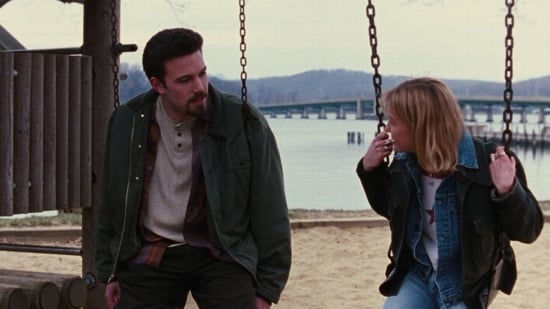
Is this what Smith really means? Would Mr. Indie say out loud “Stay away from anyone who’s different”? No — it probably is what he thinks, but only at a level deeper than he’d care to take public responsibility for. This subtext is an illusion; before you can have a subtext you have to have a text, which is precisely the communication that Smith avoids. He has made some puppets that look like his feelings about the way everybody relates to him, and with them he’s put on a puppet show about his idea of your idea of the sort of romantical story that you’d like to look at. He’s pulled out some wads of his own unexamined perceptions and flung a thing together that he hopes will correspond to just what you want to hear in just the way you want to hear it.
Everything in the movie that’s not about Holden is a red herring: cartooning is a stage prop, Black Nationalism is a minstrel show, even the nearly threatening lesbianism has nothing to do with what goes on between these characters; Smith has carefully carved away everything from his story which is inessential and made his movie with those scraps, because he doesn’t care about the shape underneath and he doesn’t think you’ll pay as much to see it.
It’s not an experiment, successful or failed, in discovering whatever might happen when a straight man and a queer woman love each other; instead it’s his semiautobiographical excuse for his inability to make a relationship work, relying on ego’s-eye views of the strengths, weaknesses, thoughts, and appearance of the parties involved while omitting the decency of an indication that the tale itself is biased. It’s the kind of story someone tells who is so unconcerned with truth that it doesn’t even occur to them to lie about it — they just avoid it, and under the influence of motivations not even related to their material they fabricate falsity.
And that, fellow popcorn-munchers, makes me angry.
So I’ve seen something I’ve disliked and been enraged; Leslie saw something she didn’t like and she sneered; what accounts for the difference between these two kinds of negative reaction? Why don’t the heathen rage? Partly it’s just that there are different ways to receive cultural product. Some years ago, when the job which supported me was even crappier than the one which does now and that of my then-mate crappier still I went with her to an episode of workgroup-goes-drinking. Bonding pretexts in those situations are pretty tenuous, and in less than a beer I was chatting with a fellow we should call “Jake,” the binder of our conversation being our agreement that we sincerely enjoyed getting high and watching old cartoons. Like there’s this game I like to play, pretending that either I or the cartoon is Russian; I know next to nothing about Russian culture so anything in the cartoon that requires cultural membership I get to lose. My favorite is a 1946 Porky Pig that takes us on a tour of American history — George Washington at this, Patrick Henry at that, Abraham Lincoln at the other — but nowhere are any of the people or events named: the whole thing is a mystery to the outsider; it’s Ivan the Terrible at the Sack of Orksputsk, Peter the Great consecrating the Festivity of Arkank, Molotov’s Great Address. You remember those — it’s all the stuff you had to stand up and recite the dates of in Russian History class.
So Jake mentions a taste for Popeye. “Mm,” I agree; “or anyway the ones before Paramount took over in ’39.” Definitely — I love the muttering Popeye; anybody who’s got that much to say to himself is okay by me. He’s my main man. Paramount Popeye, on the other hand, sucks. You can no longer communicate with him in internal dialogues, there are gratuitous nephews, there’s only one plot. Forget it; it’s no kind of Popeye at all.
“Oh, well,” says Jake. “I don’t know anything about the dates, and all that.”
“Oh. Oh! Oh.” I realized to myself. “You mean you like watching cartoons!” In the cartoon-watching sense, that is, where you feast your eyes on the pictures and relish the action. That’s different.
Not that there’s anything wrong with it. Everybody watches cartoons sometimes, and you can do it with movies, music, Great Literature, or State of the Union speeches; having a good feel for just looking at the pictures is important, in the same way that it’s important to have a certain amount of experience with and understanding of various drugs. Lots of things only are cartoons in the first place and it’s a silly mistake to think of them otherwise — Pecker, The Impostors, and Freeway are cartoon movies I liked very much. But the intoxicated state, while useful, is inherently irresponsible, and though it can do your responsibilities a lot of good to take periodic breaks from them it furthers no purpose of your own to be doped to the gills every blessed day of your life. Watching Cartoons you never see more than exactly what’s presented to your literalist eyeballs. You can regard those things with more or less acuity or sophistication, noticing or not that the backdrop jiggled or that this hand-drawn animation is especially fine or weren’t the President’s eyes brown before, but all your attention will be delivered over to elements of presentation and the experience will be one of reception.
It makes sense that from this mode you won’t be able to generate any greater indignation than “yeah, right.” Somebody’s offering you a reality and asking you to go along with the story they claim about it, but you can see the zipper on the monster’s rubber suit — yeah, right. That is so fake. Real monsters don’t have zippers on their rubber suits. Seeing through pretense means your perception is stronger than the deception, so you’re better than it is and licensed to be smug.
But can’t we all keep our shirts on? This movie… it is a movie. It’s not real. Is there really much credit to be gotten by discovering the distinction between reality and make-believe? You did notice, didn’t you, that before the princess was abducted and the sorcerer let the demons out somebody stopped you and asked for eight dollars? That’s a tip-off — nobody’s trying to keep it a secret that the princess is an actress-impostor — we’re just pretending. That spaceship — not really a spaceship. That ferocious dinosaur — not even a model; a cartoon in fact: Watch it!
When you’re offered a creative work the first thing its creators want from you is to please suspend your disbelief, to go along with this gag; just for the sake of argument, consider a forty-foot ape; let’s call him Kong. That concession granted they then mean to spin you a little thing that looks sort of like the reality you came from if that also contained also whatever unreal elements they need for the narrative: if we brought our Kong to your Manhattan, what might happen then? The contrived elements are a hypothesis, the tale an experiment.
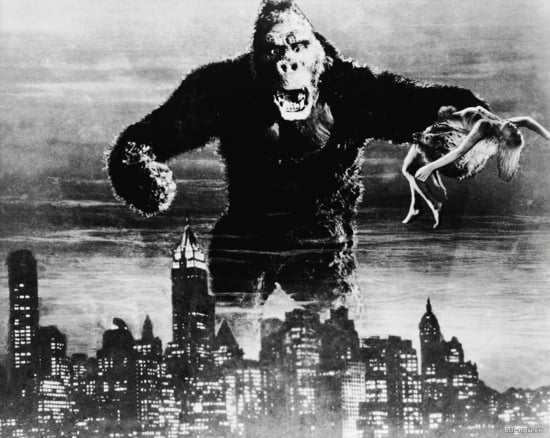
But because of the necessary resemblances of the tale’s reality to our reality many people, it would seem, skip ahead to attempt straight belief and acceptance. If coincidentally sane they understand that the events depicted are not supposed to have happened to them but still they take them as news reports from some other place. They enter the experience with only one reality-slot available in their heads, and just swap out the regular cartridge for the depiction’s. As long as that depiction remains solid there are no objections; discontent arises when seams appear, signs that the depiction is a forgery, that it comes in fact from the same reality that we did before we went into the show. For someone operating in this mode the illusion-shattering ends the experience, which is judged to have failed in a silly and dishonorable fashion: That was a wire! I no longer acknowledge your so-called “Kong.”
Tee, hee hee.
Leslie and other cartoon-watchers who laugh at old movies because they aren’t new or boo old racial stereotypings because they aren’t the ones we make now are indulging in an apathetic one-eyed fanaticism. They insist on everything being exactly the way they know it must obviously be but can’t be bothered to focus a little energy and decry the violation of their flaccid principles.
I can suggest one substantial reason for you to find fault with Touch of Evil if you want: Like much of Welles’ work it’s overblown and black-and-white gaudy. These are qualities that affect — and effect — the story being told you. They are unnecessary divergences from the story that may serve no other purpose than to get you aroused, and you might, as I do, like that in this case but it should make you suspicious of what you’re being told. It happens that one of the things I like about Welles is not this excess vivacity but the fact that he can be excessively vivacious without having that special effect corrupt his story. It is not relevant to the movie that Charlton Heston can’t speak Spanish — see, he also isn’t really a narcotics officer: He’s just pretending. Mexicality is not crucial to the movie’s themes — what the picture’s about is integrity and necessity. If Heston can’t give you the impression of integrity bewildered by situational ethics then it’s maybe the worst movie you ever saw; if he can’t give you an impression of Spanish, who cares? You want nice Spanish, go see Carmen.
Now like I said, there’s nothing wrong with a little light superficiality-Jakerie-per se. It’s when you try to make something from that that you get yourself into fits of Leslieism. Jake’s an easy-going guy — Jake Doesn’t Mind — but Leslie says Touch of Evil isn’t in color, like other movies are; Leslie says Charlton Heston doesn’t speak Spanish, like Antonio Banderas does; Leslie says “Oh my god-that guy was so fat.” Leslie takes the things she sees and compares them in a connect-the-dots fashion to all the other things she’s exposed to most; her process is a lot like morphing, that obscene computer technique developed for making cats and dogs smile on the TV to sell cat and dog food to the humans. To morph from one picture to another you don’t make any comparisons or contrasts, you don’t do any analysis or synthesis; morphing is the computer-assisted path to making two dissimilar pictures be the same picture, and the more distinctions you obliterate the better. So if the pictures Leslie sees don’t match, if the cat won’t smile, Leslie gets attitude.
Leslie doesn’t assess value; instead she checks to see whether the thing she sees matches everything else and if it doesn’t she scorns it. Her Everything Else may be drawn from High Art or checkout-stand disposables, from the Western Canon or the avantmost garde — scorn comes in all brows and traditions. Leslie finds Stephen King scary and Mary Shelley boring, not because King is simpler to read and Leslie is a simpleton (she may be or not) but because King produces “stories” that have just the same kind of scariness as all the other scary Leslie sees when she goes looking for something scary (he is after all responsible for most of those things). It’s much easier this way; the cues are all familiar so she can always tell when she’s just been scared/touched/delighted/aroused and when she hasn’t.
Scorn judges a thing successful when it can tell by similarity that what it’s being fed has been put together in accordance with The Way These Things Are Done, deviation from which demonstrates an inability to get it right. On its days off scorn returns lattes that aren’t nonfat, the way it ordered them, hello! Things succeed for Leslie to the extent that they don’t stimulate you with irritating differences. Scorn is critical soma.
By contrast, what your angry reaction has done is to reach out to and possibly into the work to try and discover what it means to mean on its own terms, and, having grasped that, made a decision about whether that meaning on those terms is sensible, truthful, beautiful, shameful, intolerable, execrable or whatever else the production itself may seem to be. It doesn’t take a Creation Scientist — all it requires is the same honest attention you give any person who’s standing there telling you something you feel you should try to understand. In school they call it “paying attention,” in relationships it’s “listening”; in any of these scenaria if you neglect it you’ll presently be finding yourself in some kind of trouble. Once you’ve heard you evaluate and decide whether your addressor is full of shit or has an excellent point, and you respond accordingly. It’s nothing in the world but the respect due someone who’s speaking to you.
Leslie never touches the things she’s shown; she just sits back glaring at the surfaces, detecting matches and mismatches — “I mean like they come into the room and the clock says 1:20, and then in the next shot it says 1:15!”. Where anger is engaging and creative, scorn is obedient, always subject to the material presented to it and one or another set of rules for dot-connecting. Leslie herself never even enters the picture — the whole thing can be done entirely without her. Very likely someone is about to open a website offering scornbots that will go out and despise stuff for you, searching the Internet for everything you wouldn’t like; when the search is complete your bot comes back and tells you nothing about the things it found except for how terribly unlike your preferences they all were. Buy the stock now — it’ll be big big big.
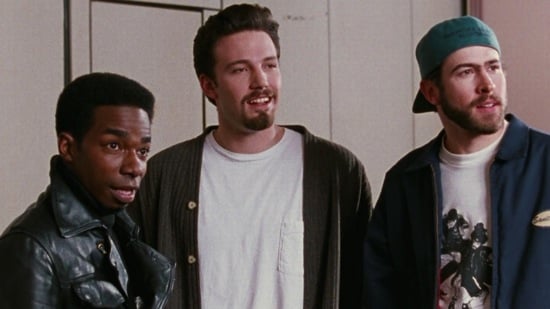
Chasing Amy shares Leslie’s refusal to engage — neither Leslie nor Smith has any intention of communicating; they may not even dream of it. Smith assembled a golem of a story, and populated it with a bunch of semblances that flap their mechanical gums to the beat of whatever notions offer the least disruption to his self-conceptions; it’s a movie about life in a Holden-shaped hole with decals of friends stuck to the walls — real friends might not always match your preferences. The fake black militant scene is probably the true core of the movie; with all the hollering and shooting there’s a lot of noise and commotion and until the gag is revealed it even seems politically threatening. But no, after all — whew! — nobody present really thought what they said or really did what they pretended; it was all void, all a lie, performed for the sake of its resemblance to other things which have been superficially perceived to exist. Scornful, lying production: The cat smiles, and Leslie the lying listener is content.
So do yourself a favor: Get bent out of shape. Join me — won’t you? — weeping with rage as spurious Dharma lies to Claymation Greg about feelings unrelated to the experience of every human person; gnash your teeth with me as pretty Meg Ryan delicately expires and sees the angels that were right there all along; feel your blood run dry as a small boy finds love and laughter in a Nazi death camp. And next time you slip up in a theater lobby and get the bejeezus beaten out of you, shake your assailant’s hand and thank them for caring. At least you’ll know there was someone else in there with you.
